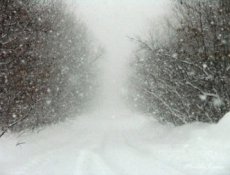|
 A storm that attacked Siberian regions did not spare Tuva. The powerful squall winds together with strong snowfall swept through roads of local significance in the western districts of the republic. Dozens of herding stations were cut off from central locations of farming enterprises. Because of the situation, at the meeting of KChS on 8 May, the decision was made on orders of the head of the republic, Sholban Kara-ool, to organize work groups to go to the affected districts to help herders. Today the leadership of the ministry of agriculture and food supply of the republic reported to Premier Sholban Kara-ool about the situation in the districts where the conditions are the worst. First and foremost, it is the remote and inaccessible Mongun-Taiga district. Automobile communication between district center Mugur-Aksy and Kyzyl-Khaya village, where the base of GUP "Mogen-Buren" is located, became impossible since 6 March; twenty-three sheep-herding stations of GUP "Malchyn" also turned out to be cut off from communication with the outside world. A storm that attacked Siberian regions did not spare Tuva. The powerful squall winds together with strong snowfall swept through roads of local significance in the western districts of the republic. Dozens of herding stations were cut off from central locations of farming enterprises. Because of the situation, at the meeting of KChS on 8 May, the decision was made on orders of the head of the republic, Sholban Kara-ool, to organize work groups to go to the affected districts to help herders. Today the leadership of the ministry of agriculture and food supply of the republic reported to Premier Sholban Kara-ool about the situation in the districts where the conditions are the worst. First and foremost, it is the remote and inaccessible Mongun-Taiga district. Automobile communication between district center Mugur-Aksy and Kyzyl-Khaya village, where the base of GUP "Mogen-Buren" is located, became impossible since 6 March; twenty-three sheep-herding stations of GUP "Malchyn" also turned out to be cut off from communication with the outside world.
- From the first day, attempts to clean the road from Mugur-Aksy direction were unsuccessful. From morning of 11 march, when the storm abated, clean-up of the road, this time from Kyzyl-Khaya direction, was organized by the director of "Mogen-Buren" Oshku-Saar Oorzhak. Not having any special snow-plowing technology, people worked manually, and cleaned off snow-banks up to 1 meter deep. Today, traffic between the populated points was re-established. The weather has stabilized - it is sunny and warm. Strong winds, which blew snow onto the roads, at the same time cleaned snow away from pastures, so that it became possible to take livestock out there to graze.
The capricious weather caused a lot of problems for herders. During the three-day storm, the livestock had to be kept stabled. At the same time, significant amount of stored fodder had to be used up. Some sheep herds, which were caught at pastures by the storm, scattered. According to preliminary data, about 70 heads of large horned cattle perished, including yaks, as well as more than 100 heads of small horned cattle mainly those who were born during last year's lambing season. As shown by laboratory exams, the cause of death was hypothermia. However, as Sergei Oyun noted, mass deaths were avoided thanks to measures taken by district administration and leadership of the farms, who were able to organize the specialists and the population. Regardless of the bad weather, delivery of oats to sheep-herding stations was organized, with the use of "Ural" borrowed from MChS. Where the "Ural" could not go, horses were used. When the powerful machinery could not go on, people often grabbed the heavy bags and took them to the stations on foot. Measures were taken to locate the scattered herds of sheep.
At the stations, the situation is more or less normal. Sheep-herders and their families have sufficient stores of food and medications. The ministries and veterinary service are working on documentation of the fallen livestock. GUP "Malchyn", which was subjected to lack of fodder, intends to purchase fodder in Sut-Khol district, and oats in neighboring Khakassia. Some of available subsidies intended for development of herding yaks and sheep are to be allocated to support the herders.
Powerful blizzards and snowfall also attacked Bai-taiga district, where for a week the road connecting the district center Teeli with Kara-Khol village was constantly blown over by snow. A bulldozer obtained by the winners of last year's Naadym came in very useful for the Bai-Taigans; it was used to constantly clean the snowdrifts. Already at the end f February, 17 tons of fodder were brought to the herders of Kara-Khol, so that the storm did not have a very detrimental effect on the condition of their livestock. Here, mass deaths of livestock were avoided as well.
In the rest of the districts of the republic, the situation was normal, as Sergei Oyun said.
The head of Tuva Sholban Kara-ool remarked on the necessity of constant review of the situation at the farms of the republic. He again cautioned that special attention has to be paid to sheep-herding stations which are located in remote and inaccessible places. The head of the region asked for daily reports on the ongoing situation. Ministry of agriculture is obligated to secure the conditions for a normal lambing season.
|
|
